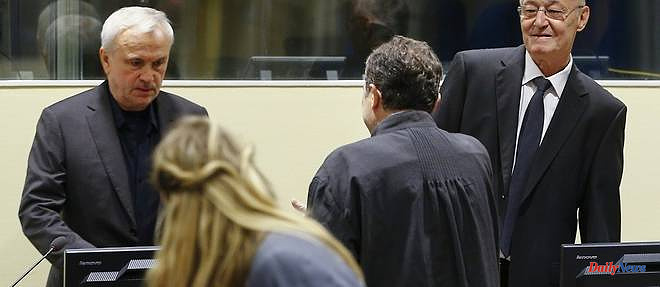A UN court upheld on appeal Wednesday the convictions of two former Serbian intelligence chiefs and increased their prison sentences to 15 years in the latest major trial in The Hague for war crimes in the Bosnian conflict of the 1990s.
Judges rejected appeals by Jovica Stanisic, head of late Serbian President Slobodan Milosevic's state security services, and his then-deputy Franko Simatovic, against their sentencing in 2021. Judges further raised their prison sentence of 12 to 15 years.
The court ruled that Stanisic, 72, and Simatovic, 73, were part of a criminal plan to "ethnically cleanse" non-Serbs from large parts of Bosnia and Croatia. In the first instance they were acquitted on this count.
This verdict is crucial because, for the first time, it officially links the atrocities committed in Bosnia to the Serbian regime of Milosevic, who died in custody in The Hague in 2006.
"It's really important", "it's the only decision we have with the direct involvement of Belgrade officials convicted in the context of a joint criminal enterprise", commented the general prosecutor Serge Brammertz in front of the journalists in the outcome of the hearing.
Munira Subasic, president of an association of mothers in Srebrenica which campaigns for justice for the victims of the 1995 genocide, said the verdict could help ease tensions still rife in the Balkans.
"Without truth, there is no justice. Without justice, there is no trust. And without trust, there is no reconciliation," she told reporters.
UN High Commissioner for Human Rights Volker Türk praised the tribunal's work and the final verdict, the outcome of which is "a major step towards establishing the truth and fighting impunity ".
Only Stanisic was in court on Wednesday. Simatovic followed the hearing via video link from his cell.
The septuagenarians have been at the center of a legal marathon since their arrest in 2003, after being acquitted in 2013 and then retried for errors of law.
This time, the judges upheld on appeal their convictions for the war crime of murder and several crimes against humanity, including persecution, forcible transfer and deportation.
But where the verdict two years ago was limited to a Serbian terror campaign against the Bosnian town of Bosanski Samac in April 1992, magistrates have dramatically broadened the sentences: the defendants were found guilty of participating in a plan concerted effort to commit crimes across the Balkans.
“Stanisic and Simatovic shared the intent to pursue the common criminal purpose of forcibly and permanently expelling the majority of non-Serbs from large areas of Croatia and Bosnia and Herzegovina,” presiding judge Graciela Gatti Santana said. .
The first has already served seven years in prison and the second just over eight years.
Several suspects, including Bosnian Serb political leader Radovan Karadzic and military leader Ratko Mladic, have already been sentenced to life in court in The Hague, but it has been harder to link crimes to Serbia itself.
This is a "historic moment for international justice", welcomed Amnesty International.
"This leaves no doubt about the involvement of the Serbian police and security services in the war atrocities in Bosnia and Herzegovina, which the Serbian authorities continue to deny to this day," observed Jelena Sesar, researcher at Amnesty. Europe, in a press release.
The case is the last left by the International Criminal Tribunal for the former Yugoslavia (ICTY), created to judge the crimes of the wars which tore the region apart after the fall of communism.
The ICTY closed in 2017 and its cases have since been handled by the Residual International Mechanism for Criminal Tribunals (MICT), also in The Hague.
The Balkan wars left about 130,000 dead and millions displaced. Tensions continue to agitate the region, particularly in Kosovo, a former Serbian province that has become independent.
burs-dk-jhe/cvo/jcp/fjb
31/05/2023 19:31:26 - The Hague (AFP) - © 2023 AFP












